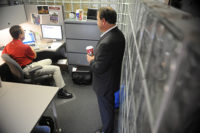Smartphone Powers Contractor's Company

Contractor
Rob Benefiel founded Certified Comfort Heating and Cooling (Louisville, Ky.).
He relies on his Android phone as the foundation of his mobile office.
Relying on his smartphone and his mobile office, Benefiel said business is great at his three-person, 18-month-old company. In his past life, Benefiel was the service manager for a large commercial company. These days he is enjoying the chance to own his own company, which is focused on residential and light commercial. “I’ve got a lot of clients I work for, but I’m my own boss,” he said. “It pays to specialize and not try to be everything to everybody.”
So far, he is staying small and being careful to not add expenses and overhead. He does this by “making use of technology and the mobile platform,” he explained. Benefiel manages all of Certified Comfort’s service calls, and also has an installer and a salesman on his payroll.
A PHONE THAT DOES IT ALL
The most important aspect of Benefiel’s mobile office is his phone. “I use an Android phone,” he said, adding that he is on a 3G network. “If you’re on your mobile phone, it’s pretty fast,” he said.Because he is concerned about not increasing overhead, Benefiel does not pay for WiFi. “I frequent a lot of coffee shops and restaurants that have WiFi,” he said. “It’s really easy to have a mobile office and not have to pay somebody $70 for a WiFi card. I’m only 18 months into this venture, so I’m still doing everything I can to minimize fixed overhead costs.”
Since Android is a Google operating system, he uses Gmail and Google Calendar on his phone. “With Gmail, I have my domain-based e-mail hosted by Google,” Benefiel said. “Gmail is so fast because it’s a push service,” he added. To put it in laymen’s terms, he explained, other e-mail providers generally operate on the principle of “go out and check,” while Gmail constantly pushes out data.
Using his phone, Benefiel coordinates his jobs without even making a phone call. He schedules installs and forwards leads to his salesman using Google Calendar and text messaging. When he schedules an install job, he loads it on his calendar, and his installer instantly gets an e-mail about it.
Additionally, the contact form on Certified Comfort’s website is synced to Benefiel’s phone, so he can forward any web leads to his salesman or installer.
“All of my contacts for my customers are in my phone, backed up by Google,” he said.
Benefiel and his installer each have Android phones. His salesman has a standard phone and a laptop. “If I want to get him immediately, I send him a text message,” Benefiel said. “All of his leads go to him via text message. The next step will be to put him on an Android phone.”
Without his phone and the system he has set up, Benefiel said he would have to carry around lots of paper and “tote around a paper calendar.” He’s happy that he can use his phone for so many functions and get so much done without actually spending a lot of time talking on it.
TWITTER, BLOGS, AND YELLOW PAGES
Benefiel is also working hard to grow his company’s online presence and credibility. One of the ways he uses his phone is to access his Twitter accounts - @robbenefiel. Twitter is a micro-blogging service that lets users make posts that are limited to 140 characters. In the Twitter community, a user can follow other users to see their posts. Benefiel currently follows about 700 other users on Twitter, and has over 500 followers himself.He said he started using Twitter on the advice of someone who helped him set up a blog, which he regularly updates on his website. When he writes a blog, he tweets out the link to let his followers know it’s been posted and build back links to his website. Recent blog topics have included everything from the revised 25C tax credits to dry winter air to zoning for bonus room comfort.
Plus, Benefiel keeps tabs on the industry and builds contacts through Twitter. To tap into the HVAC community, as well as the local Louisville community, Benefiel began searching for HVAC-related terms on Twitter, and he followed the accounts that appeared in his searches. He also uses Twitter to connect to an online community of runners and triathletes, of which he is a passionate member.
Benefiel explained that he has two Twitter accounts - one business and one personal. He accesses his accounts through a HootSuite app on his phone. “I have a business Twitter account,” he explained, which he uses for professional messages. But he will also retweet his business tweets through his personal account. “I don’t see a big separation,” he said. “I am me - I am my company, and it crosses over very easily.”
But for this reason, Benefiel is careful to maintain his professionalism in every online venue. “I don’t use any social media for venting feelings,” he said. “I’ve been known to unfollow people who are whiny on Twitter.”
Since Benefiel joined Twitter about nine months ago, he said he has gained a handful of clients through Twitter, and also indirect referrals. But, he admitted, “I haven’t used Twitter to the extent that I can use Twitter.” He plans to continue to focus on it in the future, and he knows that the links he builds to his website will help with search engine optimization (SEO). He’s also signed on with Yodle, a company that helps small businesses connect to local customers through online searches.
But despite his online focus, Benefiel hasn’t turned his back on paper. For his first year in business, he explained, he relied on direct mail to build his client base. “While doing that, I was building my web presence, buying my own domain, and building more and more content [for the company website],” he said.
Plus, he listed his company in the Yellow Pages “because the majority of people that buy HVAC are still back in the Yellow Pages.” He added, “You still have to be in there, but you can drive people to look for you. To me right now, the Yellow Pages are a way for people to find me after they know my name.”
FUTURE DIRECTION
Benefiel has big plans for the future direction of his company. “Something that we’re looking at moving into within the next year is Internet-based cloud computing,” Benefiel said. He likes the idea of all of his data being synced and backed up in the cloud.Benefiel is also looking down the road to purchasing accounting software. Currently, he is buying an annual book to track accounts, and then transferring it to a spreadsheet. “I haven’t wanted to tie myself to an accounting software, so I’ve kept everything paper,” he said.
“You may as well minimize overhead while you can,” he added. “As I grow, I’ll move away from paper books.” Benefiel said this will help him to avoid paying $35,000-40,000 in salary for a bookkeeper. “That’s where I will switch to cloud computing,” he said.
In the meantime, he plans to continue offering great service to build a loyal base of customers in Kentucky - all coordinated through his smart mobile phone.
Publication date: 02/07/2011
Smart phones get it done!
April 19, 2011
In field services there seems to be so much talk about the newest tablet or app, which makes sense, but there's still so much that can be done using smart (and even dumb) phones via text messaging and email. Great to see a story about someone making it work with their small business using new, but simple mobile technologies.






